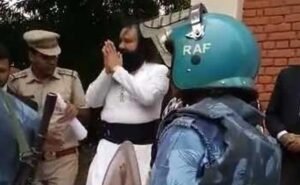The Punjab and Haryana High Court has acquitted Dera Sacha Sauda chief Gurmeet Ram Rahim Singh and four others in the 2002 murder case of Ranjit Singh, a former manager at the Dera. The acquittal overturns the 2021 conviction by a Central Bureau of Investigation (CBI) court in Panchkula. The detailed order from the high court has not yet been released.
A division bench of Justice Sureshwar Thakur and Justice Lalit Batra allowed the appeals filed by Ram Rahim and co-accused Jasbir Singh, Sabdil Singh, Krishan Lal, and Avtar Singh. The high court decision marks a significant turn in a case that has spanned over two decades and involved serious allegations of murder and conspiracy.
Background of the Case
Ranjit Singh, a manager at the Dera in Sirsa, Haryana, was murdered on July 10, 2002, while returning from his fields in Kurukshetra district. The murder was allegedly motivated by Singh’s suspected role in circulating an anonymous letter that accused the Dera chief of sexually exploiting female followers, known as sadhvis.
The case was initially investigated by local police before the Punjab and Haryana High Court transferred it to the CBI in November 2003. According to the CBI chargesheet, Ram Rahim believed Ranjit Singh was responsible for the letter, which led to the sexual exploitation allegations being publicised by journalist Ram Chander Chhatrapati, who was also murdered later.
In October 2021, a CBI special court in Panchkula convicted Ram Rahim and his associates. Jasbir Singh, Sabdil Singh, and Krishan Lal were found guilty of murder under Section 302 of the Indian Penal Code (IPC) read with Section 120B (criminal conspiracy). Ram Rahim, Avtar Singh, and others were convicted under Section 120B of the IPC read with Sections 302 and 506 (criminal intimidation). Additionally, Sabdil Singh was found guilty under Section 27 of the Arms Act, 1959.
Eyewitnesses, including Ranjit Singh’s father Joginder Singh and neighbour Sukhdev Singh, identified Jasbir and Sabdil as the shooters. Ram Rahim’s driver, Khatta Singh, testified that the Dera chief had ordered the killing during a meeting at the Dera premises in June 2002. Ram Rahim, however, claimed he was in Rajasthan at the time of the alleged meeting.
The acquittal by the Punjab and Haryana High Court has brought significant relief to Ram Rahim, who is currently serving a 20-year sentence in Rohtak’s Sunaria jail for the rape of two disciples. His lawyer, Jitender Khurana, confirmed the acquittal: “The high court has acquitted him in the Ranjit Singh murder case.”
Other Cases Of Gurmeet Ram Rahim

Despite the acquittal, Gurmeet Ram Rahim Singh remains embroiled in several other legal battles. Notably, he was convicted for the murder of journalist Ram Chander Chhatrapati in January 2019, following Chhatrapati’s publication of the anonymous letter detailing sexual exploitation at the Dera. Ram Rahim and his co-accused were sentenced to life imprisonment for this crime.
Additionally, Ram Rahim faces allegations in the castration case, where around 400 male devotees were allegedly castrated at the Dera headquarters under the false pretence of achieving spiritual enlightenment. This case, registered in 2015, saw the CBI file a charge sheet against Ram Rahim and two doctors involved.
Another notable case is the blasphemy charge from 2007, where Ram Rahim was accused of imitating Guru Gobind Singh, the tenth Sikh guru, during a ceremony. Although acquitted by a Bathinda court in 2014, a revision petition was filed in 2015.
Since his incarceration, Ram Rahim has been granted parole and furlough multiple times, raising eyebrows and prompting objections from various Sikh organizations. His frequent paroles have often coincided with elections in Haryana, Punjab, and Himachal Pradesh, leading to allegations of political influence. Despite petitions against these paroles, the courts have occasionally granted them, such as the 50-day parole in January 2024, the longest ever given to him.
The Punjab and Haryana High Court has since directed the Haryana government to seek its permission before granting any further parole to Ram Rahim.
Gurmeet Ram Rahim Singh, often described as a self-styled godman, has a significant following, particularly in Haryana and Punjab. His Dera Sacha Sauda organization claims millions of followers. Despite his legal troubles, he has maintained a high public profile, often releasing music videos and making public appearances during his paroles. His influence extends into politics, with claims of substantial support that could sway elections in the region.
The acquittal of Gurmeet Ram Rahim Singh in the Ranjit Singh murder case adds another chapter to the long and controversial legal history of the Dera Sacha Sauda chief. While he remains behind bars for other convictions, the high court’s decision underscores the ongoing complexities and legal battles surrounding his actions and influence. The Dera’s future, shaped by both legal outcomes and public perception, remains uncertain as the saga of Gurmeet Ram Rahim Singh continues.











